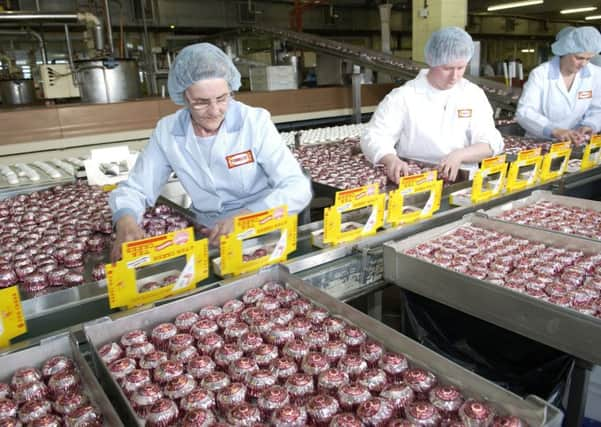David Mundell: Don't believe SNP, it's a power boost not a power grab


Spring is one of the most beautiful times of year in my part of Scotland, as the stunning Dumfries and Galloway countryside takes on a new lease of life.
The arrival of – hopefully – better weather is also the perfect opportunity to get out and about and meet people across Scotland. To hear about their lives, concerns and aspirations, and talk about what the UK Government is delivering for people in Scotland.
Advertisement
Hide AdAdvertisement
Hide AdThis week I will be visiting communities and businesses in north and north-east Scotland. Spring may not arrive till later in these parts, but the hopes and concerns of people and businesses here are the same as elsewhere in the UK as we move into the final 12 months before we leave the EU.
Scotland’s food and drink is famous across the world, as well as enjoyed all over the UK, so I am looking forward to meeting some of the men and women behind this fantastic produce, including the people behind the Aberlour Distillery and Walkers Shortbread, to hear about their experiences in domestic and international markets. Today, I’m hosting a roundtable with the Scotch Whisky Association, Scottish Salmon Producers, Scottish Retail Consortium, Tunnocks and others, to discuss food labelling and the need for a common UK approach for the benefit of consumers and businesses. Later in the week, I will meet farmers in Thainstone to discuss animal health and welfare.
High on the agenda will be the opportunities and challenges facing Scotland’s food and drink industry as the UK leaves the EU in March next year, and we forge a new role for ourselves in the world.
I know Scotland has what it takes to compete on the global stage, but I also recognise that Scotland’s biggest export market is the rest of the UK. So, I also want to talk to businesses about where we will need ‘UK frameworks’ after we leave the EU, to protect the vital UK common market.
Businesses in Scotland know – and the Scottish Government’s own figures show – that Scottish exports to the rest of the UK are worth more than £45 billion a year. That’s nearly four times the value of our exports to the whole of the EU, and almost 10 times our sales to the US, our most important single export destination.
The UK market is vitally important to Scottish businesses, and that frictionless common market – with consistent rules and regulations on things like food labelling and animal welfare – is a major asset. As we leave the EU, it must be an absolute priority to avoid anything that might obstruct trade within the UK – or that makes the UK a less attractive place for the rest of the world to do business with.
That is a key objective of the UK Government’s EU (Withdrawal) Bill, now going through the UK Parliament. The Bill will turn EU law into UK law, ensuring we have no gaps in our statute book, and giving certainty and clarity for businesses, when the EU’s regulations cease to apply.
For the past 40 years, a whole slew of decision-making powers have been held by Brussels, out of reach of our devolved administrations. Once we leave the EU the vast majority of these will transfer directly to Holyrood, hugely increasing the powers available to the Scottish Parliament.
Advertisement
Hide AdAdvertisement
Hide AdIn some of these areas we will need to continue to work together to protect that vital UK market. In a small number of areas – 24 out of more than 100 – we believe we may need to set out a UK-wide approach in legislation to do this.
So, in this small number of areas, we are proposing that powers are frozen temporarily to prevent different rules and regulations being developed across the UK, before we have had chance to work with the Scottish and Welsh governments on future arrangements.
A small number of legislative UK frameworks will also be needed for us to meet our international obligations, make trade deals and manage common resources.
So, we need to ensure common frameworks can be retained where required. This commonsense approach is what some would characterise as a ‘power grab’. In fact nothing could be further from the truth. No powers currently exercised by the Scottish Parliament will be taken away and, in fact, it will get a powers boost. We will protect the UK common market while fully respecting the devolution settlement.
Far from this being the ‘constitutional crisis’ that some predict – perhaps even hope for – this is a sensible way of ensuring that Scottish businesses can continue to trade across the UK exactly as they do now, without having to deal with multiple costly sets of regulations.
I urge the Scottish Government to continue to work with us to reach agreement on exactly where we need UK frameworks, and how we put them into practice, so the whole of the UK has a functioning statute book at the point we leave the EU. We have made a very considerable offer to the devolved administrations on how we can amend the EU (Withdrawal) Bill to meet their concerns, and we continue to discuss it with them.
People in Scotland want – and expect – their two governments to work together. It is very much in Scotland’s interest that we find an agreed way forward. The UK Government has made clear we want to work with Holyrood to find a solution. There is still time to do a deal, and I am optimistic that we will get there.
